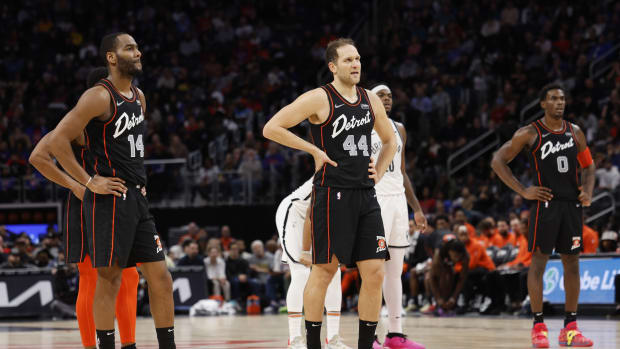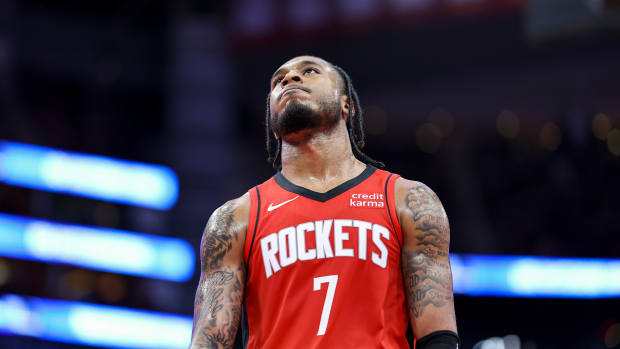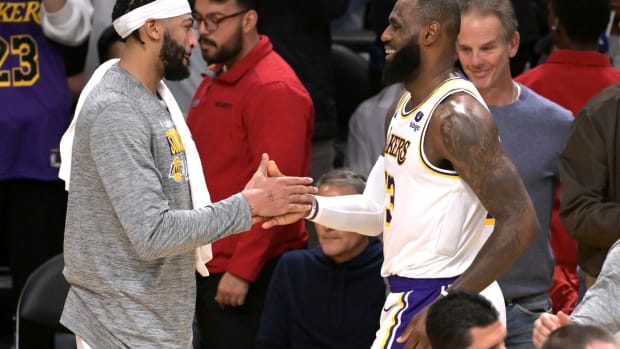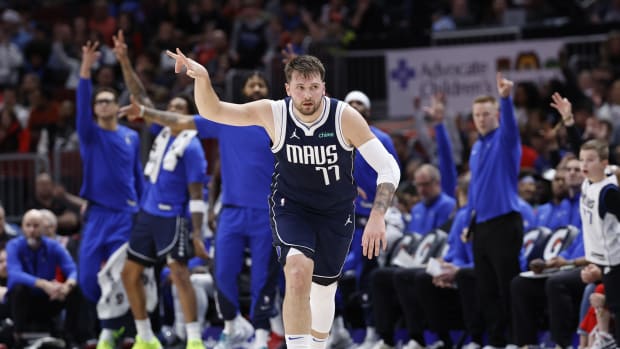Trade Grades: An Extension of the AD Deal, Pelicans-Hawks Swap Shapes Two Futures
In trading Anthony Davis to the Lakers, the Pelicans became the stewards of a valuable draft pick—No. 4 overall—they reportedly weren’t inclined to keep. After shopping around the league, New Orleans found an eager trade partner in Atlanta. The Pelicans sent the pick in question (used to select De’Andre Hunter), Solomon Hill, and a future second-round pick to Atlanta in exchange for the No. 8 pick (Jaxson Hayes), the No. 17 pick (Nickeil Alexander-Walker), the No. 35 pick (Marcos Louzada Silva) and a protected 2020 first-round pick.
Let’s grade the deal.
New Orleans: B+
The only way to evaluate this move is as an extension of the Pelicans trading Davis—a culmination of the kind of trade package they had pursued all along. In addition to the returns initially reported (Brandon Ingram, Lonzo Ball, Josh Hart, a protected 2021 first-round pick, an unprotected 2024 first-round pick and a pair of pick swaps), New Orleans was able to pick up four more draft picks while rehoming Hill and his $12.8 million contract. Typically, a team looking to shed that much salary is made to give up a first-round pick for the trouble. This move is structured differently, all because of the weight of choosing fourth overall. The only reason Atlanta would make this pitch is if their front office had eyes for a particular prospect, revealed in time to be Hunter. Granting the security of that pick turned out to be a lucrative proposition for New Orleans, both further compensating the team for losing Davis and flanking the newly drafted Zion Williamson.
An argument could be made in favor of the Pelicans making and keeping the pick as a running mate for Williamson. Had it landed in the top three—with the opportunity to select RJ Barrett—then perhaps New Orleans would have gone that route. Under the circumstances as they were, the calculus was more complicated. There is talent in this draft beyond the top three picks, but it is muddled by its context: stylistic complications, unfortunate injuries, roster redundancies, and scheduling quirks. Barring any strong leanings, the safer move was to diversify. The Pelicans ended up with another athletic big in Hayes, a smooth secondary creator in Alexander-Walker, and a prospect shooter in Silva. Not bad for a day’s work—or a week’s, going back to when Davis was traded.
The only notable component left to resolve for New Orleans is the 2020 first-round pick acquired in the deal, one that originally belonged to the Cavs. It was Pelicans general manager David Griffin, then in charge of Cleveland’s basketball operations, who traded it to Atlanta in 2017 as a means to acquire Kyle Korver. It’s an asset come full circle, and now Griffin finds himself on the other side of the draft protections he put in place. The pick is protected through the top-eight picks of the 2020 draft. Should it fail to convey then, the Pelicans would instead receive second-round picks from the Cavs in 2021 and 2022.
Atlanta: B-
For the Hawks, this move was both a vote of confidence and a means of consolidation. This front office has used the last two drafts to move toward their preferred prospects—in 2018 by moving down from No. 3 to No. 5 to select Trae Young, and in 2019 by moving from No. 8 to No. 4 to add Hunter. No teams moves this many draft picks, present and future, without the assurance of their convictions. The fit itself makes sense. Atlanta has Young to run its offense, John Collins to bring it complexity and Kevin Huerter to bring it space.
Hunter is the sort of dynamic defender who could push the young Hawks toward solvency—switchable and flexible in ways sorely needed. This deal came at quite a cost, considering the caliber of prospect available at No. 4. Yet even those costs are contextual. Atlanta already had four players on its roster who were rookies last year. Was there really room—or value—in adding four more first-year players to that mix with Nos. 8, 10, 17, and 35? It’s true that absorbing Hill’s contract may have been a more lucrative proposition under other circumstances. But what, really, is a bit of cap space to the Hawks? It wouldn’t take much for Atlanta to clear another $13 million in room if needed, and who’s to say their willingness to absorb Hill’s contract wasn’t the concession that got a deal done?
Teams vie for the same limited pool of talent, but most want slightly different things. Atlanta has clearly put a premium on identifying specific marks and landing them, bold as that might seem. This front office treats the draft as something malleable—something that, with the right assets and gathered intelligence, can be controlled. Last year, that materialized by trading out of position to draft Rookie of the Year Luka Dončić. On Thursday, it came through as a chance to add Hunter. The Hawks could give up three lower picks in the process because they had the added security of the No. 10 pick, a residual payoff from the Mavericks’ move for Dončić. That pick became Cam Reddish, and the Hawks continued on their way to league-wide relevance. Don’t dwell on how this trade looks; in a vacuum, a laundry list of draft picks can work as an optical illusion. To the Hawks, those same picks are just the cost of getting what you want.
One footnote: Since much has been made of the timing of the Anthony Davis trade and how its execution determines the salary cap space the Lakers will have left, it seems worth mentioning that the Hawks have all but closed the case. This is now a three-team trade in concept, if not in practice. Delaying the trade (as would be necessary for the Lakers to maximize their cap room) might be negotiable with one team, but not likely two—particularly when considering how little the Lakers have left to persuade them.




































